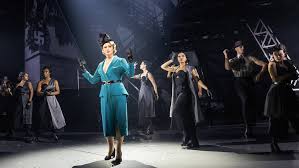
Tamara de Lempicka was an Art Deco artist who gained fame for her highly stylized nude portraits. Her work is described as refined cubism combined with neoclassical. Her entire story is fascinating. This musical based on her life is not.
All of the historical ingredients are there. Born in Warsaw she married a Russian dignitary in 1917 as the projections will dutifully inform. Immediately following it’s 1918 and the Russian Revolution has changed life forever. She flees to Paris after arranging for her incarcerated husband’s freedom. They need money, she likes to paint and an artist is born.
She discovers her bisexuality while ogling a carefree prostitute whom she paints. Her fame comes at a major Parisienne art expo with 1932’s Adam and Eve painting, one of few which contain a male nude. In this telling Adam is her husband and Eve is her lover/muse. On and on it plods along. An interesting story turned into a dull musical. You know a show is falling flat when the too frequent belting numbers pause for extended ovations which do not come.
The sets and look of Lempicka seem to have little to do with her or the Art Deco style. There is an Eiffel Tower like structure providing stairs and platforms which remains through the whole show. People traverse these elevated platforms here and there. For what purpose is the obvious question.
There are indeed some cool lighting effects in certain scenes such as when she discovers lady love in a beautifully lit smoky fade out. Other time the lights are just harsh or weird. Nothing says cheap like the depiction of the nightclub Le Monocle. Speaking of gay, the men in the ensemble are directed and choreographed to be effete caricatures which seemed overly exaggerated.
The house and the studio (same set platform) slides on and off stage awkwardly and frequently. It lumbers more than glides. Go see The Who’s Tommy or The Outsiders to get a glimpse of well designed and directed transitions. To make matters worse, people enter and exit at odd times. During Rafaela’s love ballad, Tamara departs the platform mid-song for no apparent reason.
Not all is lost. There are several supporting performances worth mentioning. Marinetti is one of Tamara’s teachers. George Abud delivers big in each of his scene stealing numbers. Beth Leavel is the Baroness who is an early supporter of Lempicka’s art. Everything Ms. Leavel does is right for the characterization. “Just This Way” is sung near the end of Act II and the song deservedly receives an extended ovation. The show finally has something memorable to say.
Amber Iman is believable and even charming as the model/whore stereotype. As the husband, Andrew Samonsky is not given a great deal to do but the growth of the person makes sense. As the titular star, Eden Espinosa is enjoyable. The show surrounding her takes so much focus off her that she is overshadowed by the theatrical excess. Multiple supporting characters overshadow the protagonist.
Rachel Chavkin (Hadestown) staged Lempicka and the direction seems to be the show’s most glaring flaw. A great history about an inventive artist for sure. A decent Broadway musical, however, this is not.
Lempicka is playing at the Longacre Theatre.
